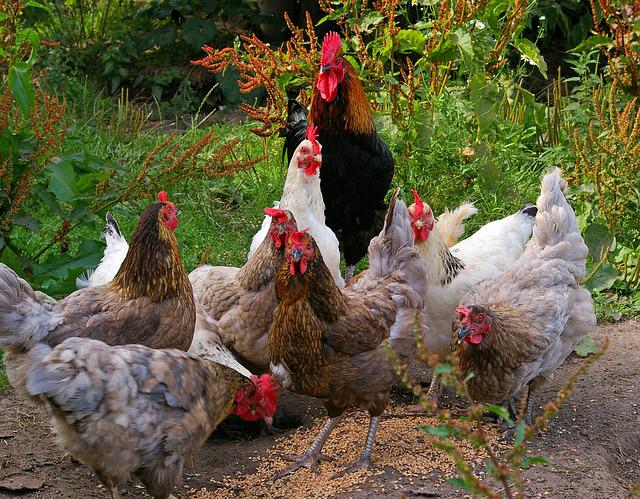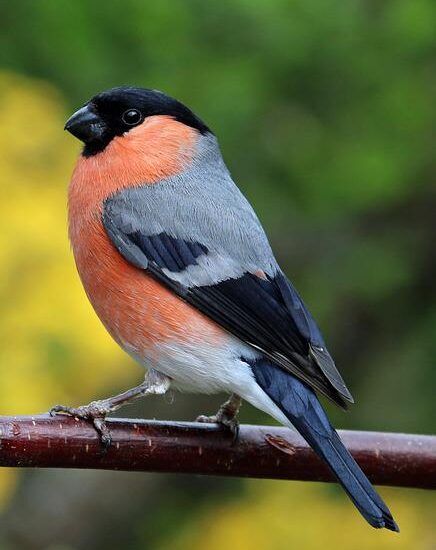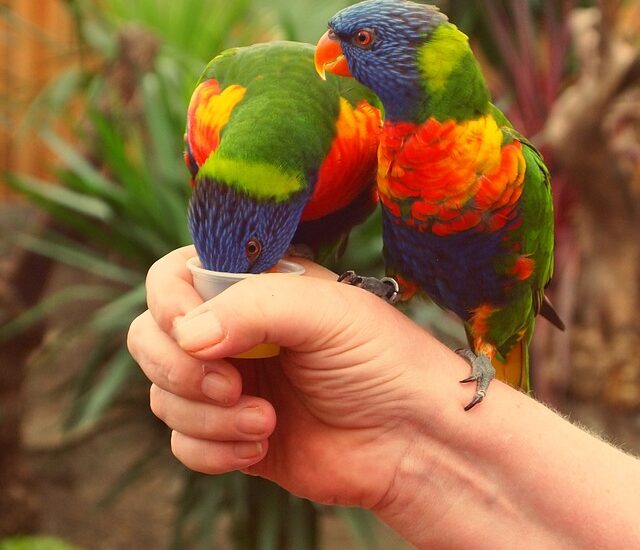Keeping Ducks with Chickens? Good Or Bad?
If you are thinking of adding ducks to your flock of chickens, it might come as a surprise to you that it is actually a quite common practice, but just because it has been done before doesn’t mean that everyone can accomplish it successfully while making sure that both the animals are content and healthy. Housing ducks with chickens comes with its own complications and preparations but if done correctly, one can’t deny the beauty in the diversity of these animals roaming in the backyard, coexisting peacefully even though both the animals have different habits and temperaments.
Chickens are called the gateway animals to other poultry animals; as keeping them alongside animals like geese, turkeys and ducks require little effort, many people choose ducks for this excursion as other than adding scenic beauty to the backyard where they can be seen waddling after each other, looking adorable, they also lay eggs which can be used for baking or even daily consumption. Both the animals are low-maintenance and after the initial set-up, need little to no effort to keep them happy on daily bases. In this article, we will take a look at the problems that might occur when housing these animals together and the best way to deal with them to live in harmony.

Housing The Chickens and Ducks Together
Keeping ducks with your chickens in the same coop can be accomplished easily if you bear a few things in mind about their separate needs and nature and put some effort into making an ideal coop that accommodates both the animal’s needs. Some of the things to consider are:
Ideal Coop for Chickens
- Chickens prefer to roost at night, climbing on any available perch or high ground to avoid predators and they generally sleep throughout the night provided that there isn’t any disturbance, adding perches in their coop which can accommodate all your chickens without any fighting over space is recommended.
- Making sure that your coop is well ventilated is essential, whether it’s the winters or summers, as constant moisture in the area will promote the growth of bacteria and mold that can end up causing various respiratory and other problems for your flock, like breeders’ pneumonia in chickens, that can be deadly for them.
- As ducks are used to the water, they prefer their habitat wet and moist thus, they will end up making the coop messy with water which can prove to be problematic for the chickens as they are not adapted to live in moist spaces, they might catch pneumonia and other diseases from the constant moisture. You can separate their enclosures by adding a wired wall in the middle, dividing the ducks and chicken area, or keeping the water source out of the coop to keep it dry.
Ideal Coop for Ducks
- The ducks are a noisy crowd, even at night when they wake up at several instances throughout the night chatting away and causing a ruckus, this can disturb your chickens’ sleep and it might take a little while for them to get used to them. They also prefer to nest at night as opposed to roosting and will need nesting material in the corner of the coop to sleep in.
- If your coop is on the raised ground, that the chickens reach by climbing a ramp, you might face a problem when introducing ducks to your flock as, despite their large built, ducks have a hard time climbing steep ramps because of their webbed feet, unlike the chickens for whom ramps are effortless. The best approach would be to add a longer, less steep ramp for the ducks to climb on easily.
- You should not overcrowd a coop, by adding too many chickens and ducks to the same area as that might lead to the animals becoming agitated and bullying the weak ones, with less overall morale of the flock. The advised space for housing one adult duck is three square feet and for one adult chicken is 2-3 square feet.

Feeding The Ducks and The Chickens
The ducks and chickens will do well roaming the backyard or garden freely, searching for food and snacks; although, you can’t solely rely on them to fend for themselves. They can be fed the same chicken feed but there are some things to consider when feeding them, including:
Duck Feed
- If your chicks are young and you are giving them medicated feed as recommended by the specialist, you have to make sure that your ducklings are not eating the same feed, as medicated feed when eaten in large amounts by the hungry ducklings can prove to be lethal for them.
- Duckling’s diets also vary slightly from the chicks as they need more amount of niacin in their diets as opposed to chicks who don’t really need the extra niacin. Ducks require niacin at an early age for neurological development and can suffer serious issues if not provided with enough. You can include brewer’s yeast and niacin-rich stuff in your duckling’s diet to overcome this problem.
- The feeding troughs can also prove to be a problem for ducks as they grow up and their bills enlarge which makes it difficult for the ducks to use the feeders commonly used for chickens. For this problem, you should buy ducks specific feeders or buy large bowls to accommodate their beaks.
Chicken Feed
- It is better if you keep the duck’s feeding bowl separate as they are messy eaters, spreading the feed and seeds everywhere while simultaneously making the feeding bowl wet and messy, which discourages the chickens from eating from the same bowl.
- Giving treats to your mixed flock is an easy job as both the animal, ducks, and chickens prefer the same treats. You can offer them plants and vegetables like cucumber, tomatoes, corn, pumpkin, squash, peas, green leafy vegetables, and even fruits like finely chopped watermelon, bananas, melons, and anything else which is easily available in your region.
- These flocks also prefer to eat slugs and worms like earthworms, mealworms which they can catch themselves if left in the garden. You should also consider feeding your animals garlic as that improves their digestive system and has other benefits too.
Comparing Water Needs For Ducks and Chickens
Water might be one of the biggest issues you have to deal with if you decide to keep your chickens and ducks together because everyone knows how much the ducks love the water and similarly how much the chickens despise being wet. To better understand your flock’s specific needs for water you need to know why the ducks love a good water source and why providing it to them might be an issue for the chickens residing alongside them, that is due to several reasons including:
- Ducks dip their food in the water to soften it up before eating it as they have trouble swallowing hard food, that is all well and good, but this also means that they dirty the water bowl which the neighboring chickens despise as chickens like their water to be clean and don’t need to soften their food as the grit actually helps them swallow.
- Ducks also need a deeper water bowl to dip their head in it, they do that to clean their eyes and keep their nostrils moist. This often results in the duck shaking its head and body after it comes out from the water and spraying the water all around the water and making muddy puddles. Chickens like their habitat completely dry and the presence of puddles not only disrupts their peaceful lives, but it is also a great breeding place for bacteria and mold.
- Ducks don’t necessarily need a pond to bathe in but having one makes them very happy, especially during summers when they can cool off in the water. With the ducks the thing that works in their favor quite a lot is their oil glands which produce oil making their feathers waterproof when they preen, thus they can spend a long time in the moisture without any adverse effect. The chickens, on the other hand, do not possess any such oil glands and therefore are much more susceptible to getting cold and wet which leads to them becoming ill especially in winters if there is excessive moisture in their environment.
- Ducks have trouble drinking water from the same nipple feeders or waterfronts as chickens because of their large bills that don’t fit in the small opening of the font and need a deeper and larger bowl than the chickens which often end up there being their bathing pool too, which ends up dirtying the water source and subsequently making a mess.
The best way to deal with the water issue is to keep the water bowl out of the coop so the ducks don’t make the entire coop wet and soggy and keep the chicken’s food bowl away from the water, so the ducks don’t make their food wet. You can put a kid’s pool outside the coop filled with water for the ducks.

The Mixed Flock Relationship
It is observed that the chickens and ducks prefer to stick with their own flocks. As soon as they are out of the coop, both the flocks will go their separate ways not messing with each other or even bothering the members of the other flock in any way, unless there is a squabble over the water and, food bowl or over the sleeping area which occurs every once in a while, if a duck tries to sneak in with a nesting hen. What is astonishing about their relationship is that no matter what the issue they are having trouble with, they eventually settle it and continue their peaceful lifestyle.
Sometimes the chickens of a mixed flock can become obsessed with pecking order, which can be quite dangerous for the ducks, as the ducks are defenseless against the sharp beaks and talons of the chickens. If this happens in your flock, you should intervene and consider separating the ducks and chickens, or you remove the chickens which are troublesome from the flock altogether.
One of the strange relationship dynamics seen in chickens and ducklings is when a hen incubates a duck’s egg and believes that the resulting duckling is her own chick, while the duckling also thinks that the hen is its mother. This is because of imprinting that takes place when a duckling hatches, the first creature it sees that’s what it believes it is, in this case, which is a hen.

Roosters And Drakes Dynamics
Drakes have quite a reputation for being territorial and pecking to show their dominance, especially during the mating season when they have a high sex drive and can harm the hens if they are not protected. Regarding this issue, it is best if you keep at least one rooster among your mixed flock as that rooster will not only guard the hens against predators, try to find them the best food, mate with several of the hens, but will also knock heads with the drake if he tries to mate with a hen.
Roosters and drakes can live in the same flock without any trouble if brought up together, but their fights can get bloody in that case it is better to separate them. Generally, your flock of chickens and ducks will coexist without problem, and if problems do arise you will notice that it is largely because of only one or two members of the flock, in that case, it’s better to replace those troublemakers from your flock and hope that it does not happen again.



